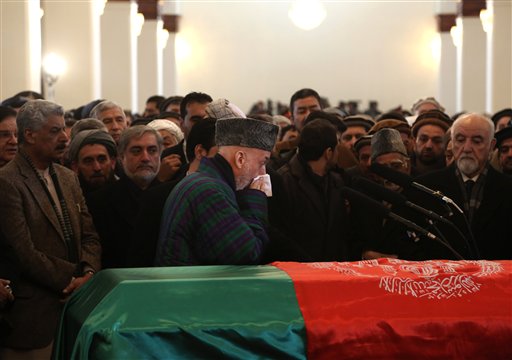KABUL, Afghanistan (AP) — A Swedish journalist was shot to death while he was talking to a translator Tuesday on a street in Kabul, according to officials and witnesses.
Nils Horner, 51, who also had British citizenship, had worked for Swedish Radio SR since 2001 as a foreign correspondent mostly in Asia and the Middle East, including Afghanistan and Baghdad.
The motive was unclear. Taliban spokesman Zabihullah Mujahid denied responsibility for the attack, which came two months after a suicide bombing and shooting attack against a Lebanese restaurant that killed 13 foreigners and eight Afghans in the same area.
A guard at a restaurant across the street from the attack said two young men approached the journalist as he was talking to his translator at about 11 a.m. on the side of the road. The area is home to several embassies.
The guard, Mohammad Zubair, said one of the men pulled out a pistol and shot Horner in the head, causing him to collapse in a pool of blood. He said there was a single shot and the bullet then hit a nearby Mercedes Benz, which had a bullet hole.
Zubair said he and other guards called to police at a nearby checkpoint and they began an investigation.
Sayed Gul Agha Hashimi, the head of the Kabul Criminal Investigation Department, earlier said two suspects had been arrested, but then clarified that police were questioning the journalist’s driver and translator.
Hashimi said the journalist died while being treated at the hospital.
Swedish Embassy counselor Christian Nilsson said the body had been transported to the morgue and police were investigating.
Swedish Radio chief Cilla Benko said it was “one of the worst days in the history of Swedish Radio.”
“Nils was one of our very best and most experienced correspondents,” she said.
The attack came as security in the capital was tight amid fears of violence in connection with the funeral of Afghanistan’s powerful Vice President Mohammed Qasim Fahim.
Thousands of Afghans waving flags and chanting crowded into a Kabul cemetery and thronged an ambulance carrying Fahim’s flag-covered coffin to the gravesite.
Fahim, who died on Sunday at 57, was an ethnic Tajik and a leading commander in the Northern Alliance, which battled the Taliban for years and helped the U.S. in ousting the Islamic militant movement from power in 2001. His death came a month before presidential elections to choose a successor to Hamid Karzai, who is barred from seeking a third term.
At a funeral service earlier in the presidential palace, Karzai lauded him for always promoting national interest.
“I lost my best friend and my brother,” Karzai said, surrounded by tribal leaders and other Afghan dignitaries and foreign diplomats. “He was always with me in making important decisions on international and domestic issues.”
Fahim was the top deputy of Ahmad Shah Massoud, the charismatic Northern Alliance commander who was killed in an al-Qaida suicide bombing two days before the Sept. 11, 2001, attacks.
He was widely accused of marginalizing Pashtuns in the years after the Taliban were ousted, but later reconciled with Karzai and was widely considered somebody who could mediate between factions.
Karzai’s office said Fahim — who held the rank of field marshal and had survived several assassination attempts, most recently in 2009 in northern Afghanistan — died of natural causes in Kabul.
___
Associated Press writers Amir Shah in Kabul and Matti Huuhtanen in Helsinki contributed to this report.

COMMENTS
Please let us know if you're having issues with commenting.